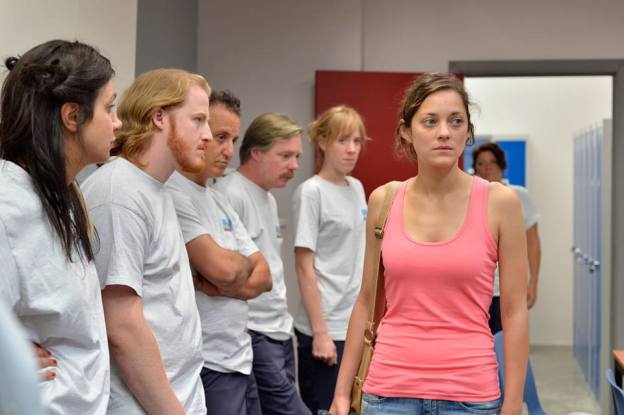I so rarely cry if I am not watching a film. Unless I am completely devastated, it verges on being impossible. But to begin with, I think I probably came in feeling a little emotional. I got teary just watching the Vancouver International Film Festival’s (VIFF) intro clip that thanks its volunteers. Actually, I swelled up with a fleeting sentimentality every time VIFF played that clip, even though it paled in comparison to the hilarious and expertly executed clips used in past years. I suppose there is something about the thought of hundreds of people volunteering their time, unified exclusively on account of their love for film, which provokes a more or less extreme reaction of tenderness totale within me.
Starring Marion Cotillard as Sandra, Two Days, One Night is directed by Belgium’s acclaimed Dardenne brothers. The film closely examines Sandra trying to save her job, after her boss forces her co-workers to pick between Sandra and their bonus. Quickly, her struggle with anxiety, depression, and prescription drugs captures the foreground. The film is an ultra-realistic and – often harrowing – portrayal of that ‘ordinary’ kind of mental illness: one all of us have either experienced firsthand or witnessed. For this reason, it is flawless in its intimate yet circumspect portrayal of a woman grappling with her mental health.
After watching thousands of films, I’ve noticed that not only do I always cry at endings but often throughout unimpressive or undramatic moments. I fell into a few of my typical instances of emotiveness throughout the film, but was especially moved when I was isolated with Sandra. Forced to watch as she traverses the formless (and often elusive) depression within herself, we take in her small defeats, her throat closing in on itself as she wrestles with her inward suffocation. Against a background of recession, Sandra tries to connect with her co-workers but we see how they also struggle to make ends meet. What follows her instances of panic is a need to release. When we watch her cry we are really being given the space to feel the same degree of anguish and helplessness that we might find within ourselves when taken in by that overwhelming feeling of panic. Cotillard is so convincing that we feel like we are standing within her space, watching our own mother. She’s crying, again. Just get it out, already. The film draws on this experience, re-encountering the paradoxically commonplace and exceptional circumstance of depression.
We remember thinking, or even saying: Please. Stop crying. It is uncomfortable to watch. There seems to be something about the act of crying that is so vulnerable, beautiful and so out of our control. It is tugged out of us. Sometimes we are in a crowd, or we’re out and unexpectedly break down from behind our sunglasses, or between doorways, hiding in our hands. In bed, safely tucked away. Sometimes we are loud about it, sometimes we are still and silent. Yet when we we see someone that is crying in a public space, our instinct is to look away. The public sphere is not for crying, or any substantive emotion that might strike passer-bys as out of the ordinary. Yet, we have no problem bearing witness to dramatic (and often violent) scenarios depicting the human condition on film.
After watching Two Days, One Night I have come to understand my uncontrollable emotive instincts as a kind of attempt to interrogate my own circles of anxiety. For me, the movie theatre is a space where I can engage with the emotions I overpower everyday, where I can examine how I practice my life in an often emotionally withdrawn way. There’s no time to cry right now. But in the movie theatre, I instead think: this isn’t the time to resist this.
I’ve always struggled with a kind of shame about how detached I can be in certain ‘real-life’ moments, yet later that night, I fantasize about being able to cry in public. Maybe I could learn to let go like that. I imagine learning to control how and when to cry and not needing to rely on films just to shed a single tear. Still, the very power of film lies within the space it creates for us to feel what we cannot, or will not, in our own lives. In order to better connect the complex shapes of my own anxiety, I have to let myself be a part of them, engage with them, discuss them, and – in this case – write about them. Perhaps, the film’s greatest take-away is, quite simply, you are capable – of being in this destructive state but, also, of overcoming it.
Stefana Fratila is Romanian-born Master’s student in Political Science at UBC. She is also a feminist, electronic artist/producer, interpreter, translator, and writer living on unceded Coast Salish Territory.
Follow Stefana on Twitter @stefanafratila
Or
Facebook: http://www.facebook.com/stefanafratila
SoundCloud: http://soundcloud.com/stefanafratila




